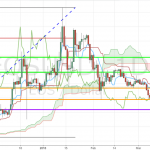Retail is a very difficult business. There are no customer switching costs, there are high fixed costs and there are few barriers to entry. One look through my Value Fail page makes it evident that a number of retailers have played a key role in my losses. And yet I just haven’t learned this lesson fast enough.
I have finally given up on my last one…for now. I sold all of my shares of HGG for a loss, and so for the moment I have no retailers left in the portfolio. This was a fine company for many years, and so I was fooled into thinking that would continue…but it didn’t. Management seemed to be doing all the right things: cutting costs, focusing on its strengths (appliances and difficult-to-transport/install products), which kept me in it for longer than I should have, but things just continued to deteriorate.
Finally, a number of executives have departed as of late, suggesting the company is probably on track for its millionth (not an exaggeration, I actually counted) quarter in a row of deteriorating results. Busted management, busted thesis.
I think what has kept me interested in retail despite the negative results I can point to is that I’ve also had many positive results. For every RadioShack, Tesco, and Aeropostale, I have a BestBuy (BBY), Alco Stores and Kirkland’s (KIRK) with terrific returns. I’ve even made money on HGG during previous bouts of negative sentiment!
But I don’t think that argument is good enough. It’s easy to have some stocks with good returns; all you have to do is buy a few, and some will inevitably go up. It’s much harder to prevent losses, and so this is where my focus should be. As per Buffett’s two rules: 1) don’t lose money, and 2) see #1.
When a retailer hits tough times, as all companies do, it’s much harder for it to recover than a company with, say, sticky customers. With that in mind, I am now much more prudent when it comes to adding retailers to the portfolio. That doesn’t make this loss hurt any less, however!














Leave A Comment